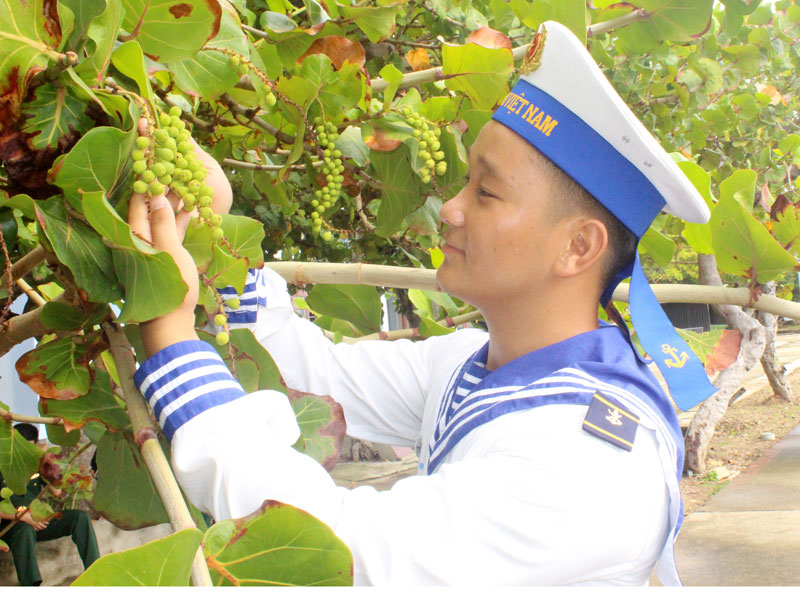
(HBO) - In the large Truong Sa Islands, known as the heart of the beloved Truong Sa, in addition to the square stormy eagle trees, Camellia sinensis is a popular plant grown all over the island.
Camellia
sinensis has a strong vitality, even though the far-away island is all year
round in storms and salty sea salts, this tree still grows and develops
steadily, creating a green color full of vigor among the immense coincidence.
The bunches full of fruits with the shape identical to the bunches of grapes on
the mainland, therefore the officials and soldiers on the island have called
them with the lovely name of the "Sea Grape”. Below are photos of this
resilient tree that the journalist of Hoa Binh newspaper has recorded on a
mission to Large Truong Sa.
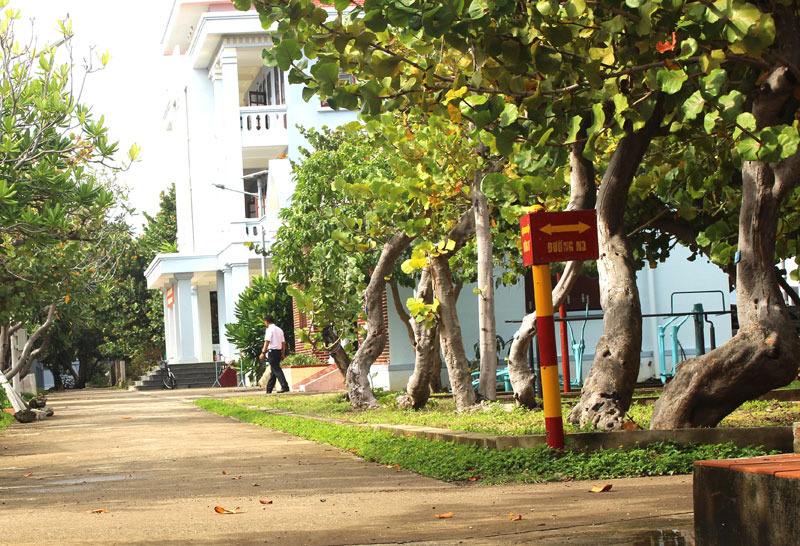 Along
with the eagle trees and the square eagle trees, "sea grapes” are most grown on
Large Truong Sa Islands.
Along
with the eagle trees and the square eagle trees, "sea grapes” are most grown on
Large Truong Sa Islands.
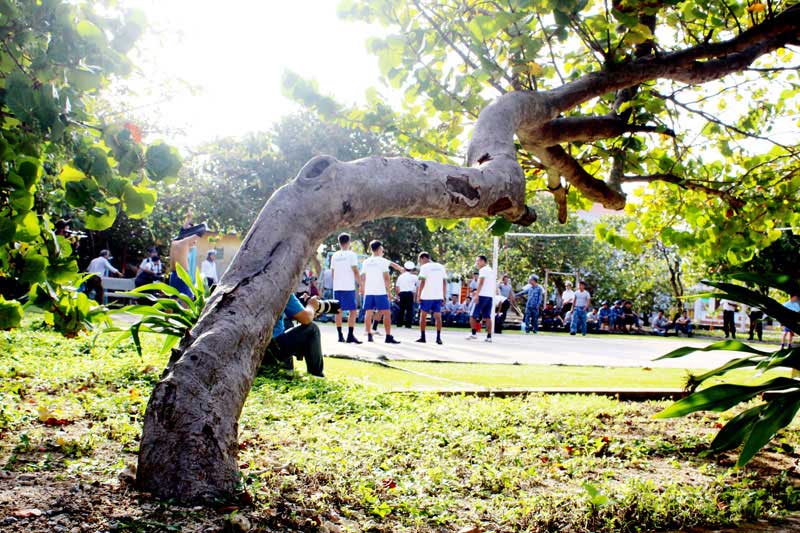 Severe
sunshine, wind and thunderstorms have created a "unique” position for the "sea
grapes”.
Severe
sunshine, wind and thunderstorms have created a "unique” position for the "sea
grapes”.
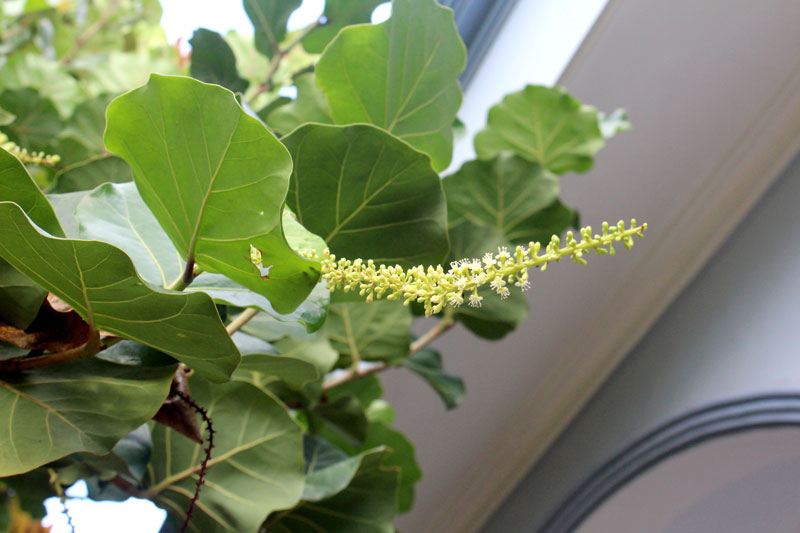 The
leaf with the size of the adult's both hands is shaped like a lotus leaf. And
the flowers are white with the pleasant smell.
The
leaf with the size of the adult's both hands is shaped like a lotus leaf. And
the flowers are white with the pleasant smell.
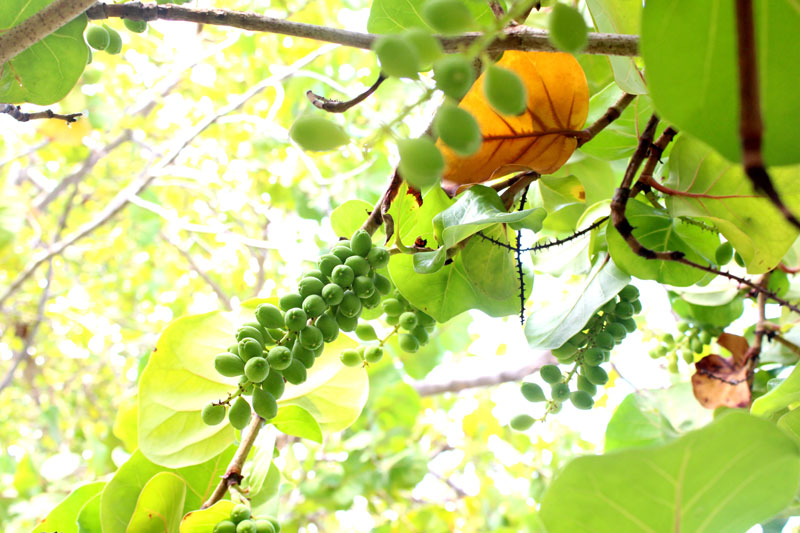 The
bunches of "sea grapes” are laced in the leaves.
The
bunches of "sea grapes” are laced in the leaves.
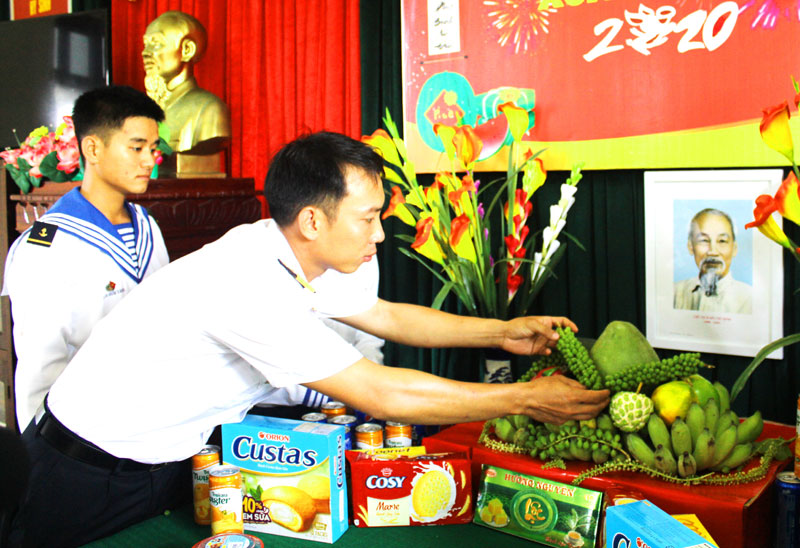 The
bunches of "sea grapes” are indispensable in the five-tray fruits of Tet
holiday for officers and soldiers on Large Truong Sa Island.
The
bunches of "sea grapes” are indispensable in the five-tray fruits of Tet
holiday for officers and soldiers on Large Truong Sa Island.
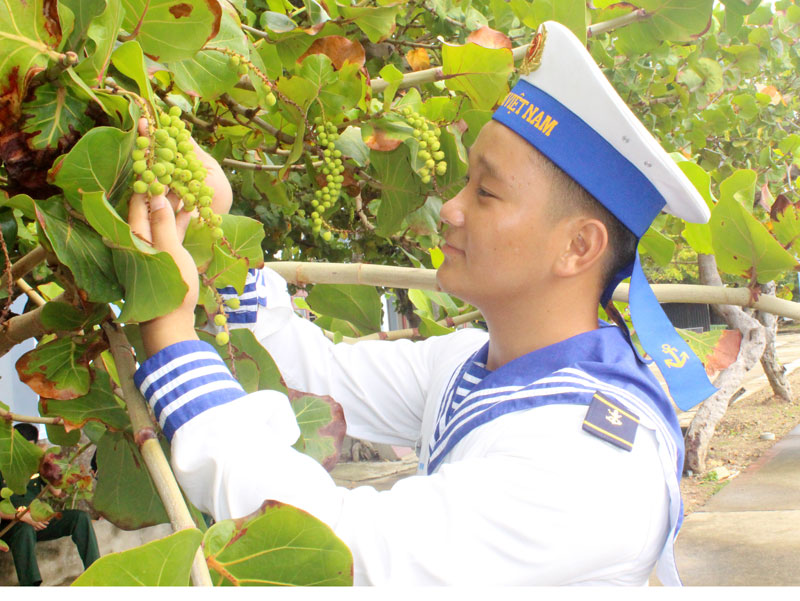 Young
soldiers with bunches full of "sea grapes”.
Young
soldiers with bunches full of "sea grapes”.
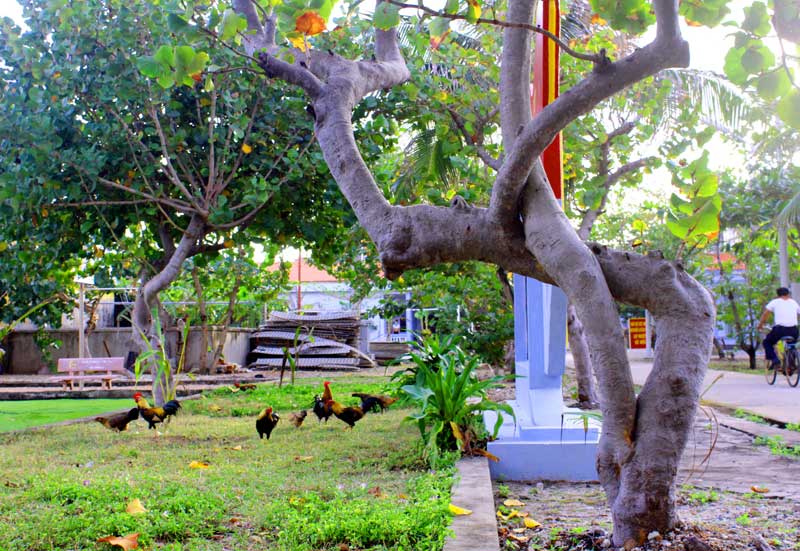 "Sea
grapes” with unique curving shapes have created an interesting landscape
highlight on Large Truong Sa Island.
"Sea
grapes” with unique curving shapes have created an interesting landscape
highlight on Large Truong Sa Island.
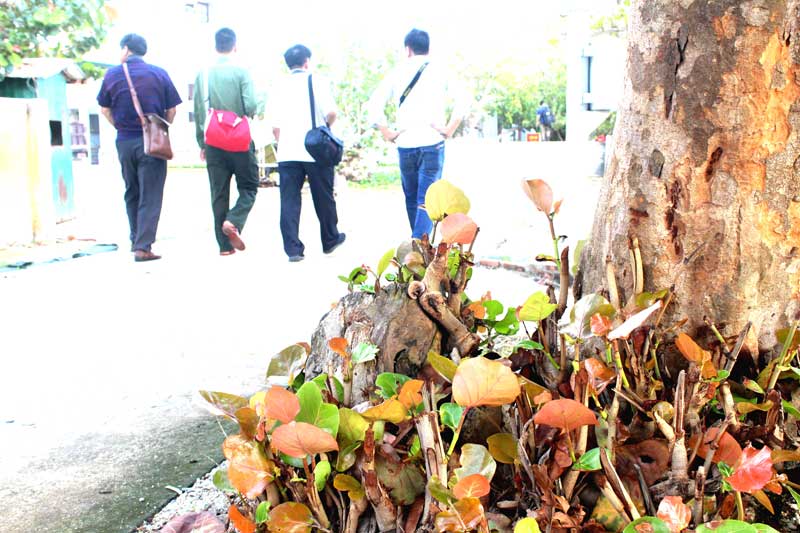 The
"Sea grape” is a tree with strong vitality, resistant to the wind, sunshine and
salt of the sea. It is also a symbol of the loyalty of the Vietnamese army and
people in the sacred Truong Sa Islands of the Fatherland.
The
"Sea grape” is a tree with strong vitality, resistant to the wind, sunshine and
salt of the sea. It is also a symbol of the loyalty of the Vietnamese army and
people in the sacred Truong Sa Islands of the Fatherland.
In the last historic days of April, blending with the joyful atmosphere of the whole country, on the streets of Hoa Binh City, flags, banners and slogans are brilliantly decorated to celebrate the 50th Anniversary of Southern Liberation and National Reunification. Here are the records from Hoa Binh newspaper’s reporters:
Nestled halfway up the mountains in Cao Son commune, Da Bac district, Sung village appears like a picture preserved intact through generations. With a history of over 300 years, the village is home to nearly 100 households of Dao Tien ethnic group – the people who still maintain their distinctive characteristics in housing architecture, clothing, customs and traditional crafts. The village is drawing increasing interest and exploration from both domestic and international tourists, as every visit becomes a cultural journey to experience the authenticity, friendliness, and hospitality of this highland region.
This Spring, more than 1,000 phoenix trees in Thang Hamlet, Thach Yen Commune (Cao Phong) have bloomed brilliantly, quickly spreading on social media. The picturesque beauty of the flower garden has attracted the participation of many people to admire and take photos.
This belief is both a guiding principle and a lifelong ambition for Sa Van Cam, a member of the Tay ethnic group in Da Bac district and a passionate advocate for the Tay culture. The native has devoted years to the revival, preservation, and teaching of the ancient Tay script.
Located just 25 km from Hoa Binh city and approximately 100km from Hanoi, with a journey of around 1 hour 45 minutes, Ngoi Hoa ecotourism site (PriorBay Resort) in Suoi Hoa commune, Tan Lac district, is a stunning peninsula retreat, and a standout destination within the Hoa Binh Reservoir tourism area. Officially opening in February this year, the resort captivates visitors with its distinctive vacation products and a range of exciting adventure experiences.
Over 1,500 women paraded in traditional ao dai (long dress) at Hoa Binh Square on March 5 to mark Ao Dai Week 2025 launched by the Vietnam Women's Union. Organised by the provincial Women’s Union in collaboration with the city’s chapter, the annual event features lively folk dance performances and a colorful parade that celebrated the beauty of Vietnam’s traditional dress and its rich cultural heritage.



 Along
with the eagle trees and the square eagle trees, "sea grapes” are most grown on
Large Truong Sa Islands.
Along
with the eagle trees and the square eagle trees, "sea grapes” are most grown on
Large Truong Sa Islands. Severe
sunshine, wind and thunderstorms have created a "unique” position for the "sea
grapes”.
Severe
sunshine, wind and thunderstorms have created a "unique” position for the "sea
grapes”. The
leaf with the size of the adult's both hands is shaped like a lotus leaf. And
the flowers are white with the pleasant smell.
The
leaf with the size of the adult's both hands is shaped like a lotus leaf. And
the flowers are white with the pleasant smell. The
bunches of "sea grapes” are laced in the leaves.
The
bunches of "sea grapes” are laced in the leaves. The
bunches of "sea grapes” are indispensable in the five-tray fruits of Tet
holiday for officers and soldiers on Large Truong Sa Island.
The
bunches of "sea grapes” are indispensable in the five-tray fruits of Tet
holiday for officers and soldiers on Large Truong Sa Island. Young
soldiers with bunches full of "sea grapes”.
Young
soldiers with bunches full of "sea grapes”. "Sea
grapes” with unique curving shapes have created an interesting landscape
highlight on Large Truong Sa Island.
"Sea
grapes” with unique curving shapes have created an interesting landscape
highlight on Large Truong Sa Island. The
"Sea grape” is a tree with strong vitality, resistant to the wind, sunshine and
salt of the sea. It is also a symbol of the loyalty of the Vietnamese army and
people in the sacred Truong Sa Islands of the Fatherland.
The
"Sea grape” is a tree with strong vitality, resistant to the wind, sunshine and
salt of the sea. It is also a symbol of the loyalty of the Vietnamese army and
people in the sacred Truong Sa Islands of the Fatherland.